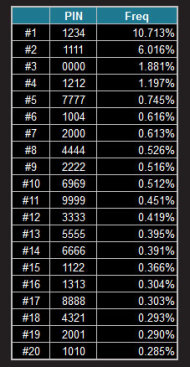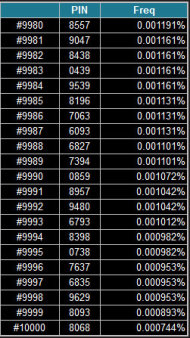Which of the top ATM Pins Do You Use?
To state the obvious, identify thieves are always present and ever active. They are constantly looking to take advantage of the unsuspecting average person in any way they can. Sometimes, we make it way to easy for them by not paying attention to the little details in life. Take for example the story listed below.Cracking Your PIN Code: Easy as 1-2-3-4
By Lisa Scherzer | The Exchange – Fri, Sep 21, 2012 9:01 AM EDT
If you lost your ATM card on the street, how easy would it be for someone to correctly guess your PIN and proceed to clean out your savings account? Not long, according to data scientist, Nick Berry, founder of Data Genetics, a Seattle technology consultancy.
Berry analyzed passwords previously from released and exposed password tables and security breaches and filtered the results to just those that were exactly four digits long [0-9]. There are 10,000 possible combinations that the digits 0-9 can be arranged to form a four-digit code. Berry analyzed those to find which are the least and most predictable. He speculates that if users select a four-digit password for an online account or other web site, it's not a stretch to use the same number for their four-digit bank PIN codes.
What he found, he says, was a "staggering lack of imagination" when it comes to selecting passwords. Nearly 11% of the 3.4 million four-digit passwords he analyzed are 1234. The second most popular PIN in is 1111 (6% of passwords), followed by 0000 (2%). (Last year SplashData compiled a list of the most common numerical and word-based passwords and found that the "password" and "123456" topped the list.)
 Berry says that a whopping 26.83% of all passwords could be guessed by attempting just 20 combinations of four-digit numbers (see first table). "It's amazing how predictable people are," he says.
We don't like hard-to-remember numbers and "no one thinks their wallet will get stolen," Berry says.
Days, months, years
Many of the commonly used passwords are, of course, dates: birthdays, anniversaries, the year you were born, etc. Indeed, using a year, starting with 19__ helps people remember their code, but it also increases its predictability, Berry says. His analysis shows that every single 19__ combination be found in the top 20% of the dataset.
"People use years, date of birth — it's a monumentally stupid thing to do because if you lose your wallet, your driver's license is in there. If someone finds it, they've got the date of birth on there. At least use a parent's date of birth [as a password]," says Berry.
Keyboard patterns
Berry says that a whopping 26.83% of all passwords could be guessed by attempting just 20 combinations of four-digit numbers (see first table). "It's amazing how predictable people are," he says.
We don't like hard-to-remember numbers and "no one thinks their wallet will get stolen," Berry says.
Days, months, years
Many of the commonly used passwords are, of course, dates: birthdays, anniversaries, the year you were born, etc. Indeed, using a year, starting with 19__ helps people remember their code, but it also increases its predictability, Berry says. His analysis shows that every single 19__ combination be found in the top 20% of the dataset.
"People use years, date of birth — it's a monumentally stupid thing to do because if you lose your wallet, your driver's license is in there. If someone finds it, they've got the date of birth on there. At least use a parent's date of birth [as a password]," says Berry.
Keyboard patterns
 Somewhat intriguing was #22 on the most common password list: 2580. It seems random, but if you look at a telephone keypad (or ATM keypad) you'll see those numbers are straight down the middle — yet another sign we're uncreative and lazy password makers.
...
Somewhat intriguing was #22 on the most common password list: 2580. It seems random, but if you look at a telephone keypad (or ATM keypad) you'll see those numbers are straight down the middle — yet another sign we're uncreative and lazy password makers.
...
 Berry says that a whopping 26.83% of all passwords could be guessed by attempting just 20 combinations of four-digit numbers (see first table). "It's amazing how predictable people are," he says.
We don't like hard-to-remember numbers and "no one thinks their wallet will get stolen," Berry says.
Days, months, years
Many of the commonly used passwords are, of course, dates: birthdays, anniversaries, the year you were born, etc. Indeed, using a year, starting with 19__ helps people remember their code, but it also increases its predictability, Berry says. His analysis shows that every single 19__ combination be found in the top 20% of the dataset.
"People use years, date of birth — it's a monumentally stupid thing to do because if you lose your wallet, your driver's license is in there. If someone finds it, they've got the date of birth on there. At least use a parent's date of birth [as a password]," says Berry.
Keyboard patterns
Berry says that a whopping 26.83% of all passwords could be guessed by attempting just 20 combinations of four-digit numbers (see first table). "It's amazing how predictable people are," he says.
We don't like hard-to-remember numbers and "no one thinks their wallet will get stolen," Berry says.
Days, months, years
Many of the commonly used passwords are, of course, dates: birthdays, anniversaries, the year you were born, etc. Indeed, using a year, starting with 19__ helps people remember their code, but it also increases its predictability, Berry says. His analysis shows that every single 19__ combination be found in the top 20% of the dataset.
"People use years, date of birth — it's a monumentally stupid thing to do because if you lose your wallet, your driver's license is in there. If someone finds it, they've got the date of birth on there. At least use a parent's date of birth [as a password]," says Berry.
Keyboard patterns
 Somewhat intriguing was #22 on the most common password list: 2580. It seems random, but if you look at a telephone keypad (or ATM keypad) you'll see those numbers are straight down the middle — yet another sign we're uncreative and lazy password makers.
...
Somewhat intriguing was #22 on the most common password list: 2580. It seems random, but if you look at a telephone keypad (or ATM keypad) you'll see those numbers are straight down the middle — yet another sign we're uncreative and lazy password makers.
...
Original located at http://finance.yahoo.com/blogs/the-exchange/cracking-pin-code-easy-1-2-3-4-130143629.html
The point here is that things happen. You have to always be on guard even with the little things. The second you don't, little things and cause big problems. And the problem is that once your identify is stolen, it could be extremely difficult to recover, if you are not protected in some way. What kind of protection you might ask?
If you enjoyed, please share and comment. Thanks.
P.S. Seeking an affordable solution for your life's little issues? Click Here
No comments:
Post a Comment